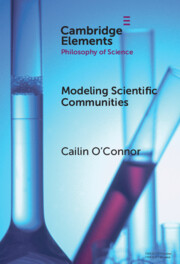Modelling Scientific Communities
This Element will overview research using models to understand scientific practice. Models are useful for reasoning about groups and processes that are complicated and distributed across time and space, i.e., those that are difficult to study using empirical methods alone. Science fits this picture. For this reason, it is no surprise that researchers have turned to models over the last few decades to study various features of science. The different sections of the element are mostly organized around different modeling approaches. The models described in this element sometimes yield take-aways that are straightforward, and at other times more nuanced. The Element ultimately argues that while these models are epistemically useful, the best way to employ most of them to understand and improve science is in combination with empirical methods and other sorts of theorizing.
Reviews & endorsements
‘A thoughtful, comprehensive, and critically engaged overview of the philosophy of science literature concerned with the social dimensions of scientific inquiry. … the volume serves as an ideal entry point for anyone interested in how philosophers have approached the shape and dynamics of scientific communities. It is … an excellent overview of the philosophical literature on the modeling of scientific communities. It navigates a wide range of technical topics with ease and clarity, and the right level of detail.’ Ignacio Ojea Quintana, Metascience
Product details
December 2023Hardback
9781009454087
94 pages
235 × 156 × 10 mm
0.29kg
Available
Table of Contents
- 1. Introduction
- 2. The credit economy
- 3. The natural selection of science
- 4. Social networks and scientific knowledge
- 5. Epistemic landscapes
- 6. The replication crisis and methodological reform
- 7. The replication crisis and methodological reform
- Bibliography.






